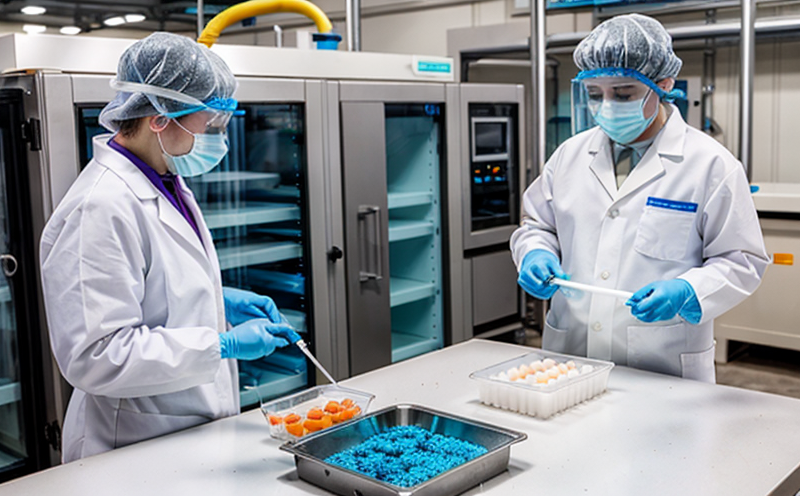ASTM E2149 Antimicrobial Activity Evaluation for Toy Fabrics
The ASTM E2149 standard provides a method to evaluate the antimicrobial activity of fabric materials used in toys. This test is essential for ensuring that toys are safe and do not pose a risk of microbial contamination, especially given children's direct contact with these products.
ASTM E2149 outlines a procedure where a standardized inoculum is placed on the surface of the fabric, followed by incubation under controlled conditions. The antimicrobial properties of the fabric are then assessed based on the reduction in microbial count following exposure to various antimicrobial treatments or coatings.
This testing method is particularly critical for toys that come into frequent contact with children's skin and mouths. Ensuring the safety of toys is paramount, as infants and toddlers often place objects directly into their mouths, increasing the risk of microbial transmission. The standards aim to prevent the spread of harmful pathogens while promoting a safe play environment.
The ASTM E2149 procedure involves several steps: inoculation, incubation, washing (if applicable), drying, and re-inoculation for comparison. This process helps simulate real-world conditions that might affect the performance of antimicrobial treatments over time. The standard specifies the types of microorganisms used in testing, ensuring consistency across different laboratories.
The results from ASTM E2149 are crucial for manufacturers to determine whether their products meet regulatory requirements and consumer expectations. Compliance with these standards not only protects children's health but also enhances brand reputation by demonstrating a commitment to safety and quality.
It is important to note that the ASTM E2149 standard focuses on fabric surfaces, which are often the primary point of contact for children when using toys. This testing ensures that even after multiple washings or prolonged use, the antimicrobial properties remain effective. The methodology is designed to be robust and applicable across a wide range of toy materials, including textiles, plastics, and coatings.
The test results can inform product development decisions, helping manufacturers optimize their antimicrobial treatments for maximum efficacy while minimizing potential risks. By adhering to ASTM E2149, companies can ensure that their products meet the highest standards of safety and comply with relevant regulations.
Benefits
- Enhanced Safety: Ensures toys do not pose a risk of microbial contamination, protecting children's health.
- Regulatory Compliance: Helps manufacturers meet international safety and quality standards.
- Improved Reputation: Demonstrates a commitment to product safety and consumer protection.
- Informed Decision-Making: Provides data that can guide the development of safer, more effective antimicrobial treatments.
Eurolab Advantages
As a leading independent testing laboratory, Eurolab offers unparalleled expertise and advanced facilities for ASTM E2149 compliance. Our team of experienced professionals ensures accurate and reliable test results, providing peace of mind to our clients.
- Accurate Testing: State-of-the-art equipment and strict adherence to international standards ensure precise results.
- Expertise: Our scientists have extensive experience in toy safety testing, bringing a wealth of knowledge to every project.
- Comprehensive Support: From initial consultation to final report, we provide comprehensive support throughout the entire process.
- Timely Delivery: We understand the importance of timely results and strive to deliver reports within agreed timelines.
Quality and Reliability Assurance
- ISO/IEC 17025 Accreditation: Our laboratory is ISO/IEC 17025 accredited, ensuring the highest standards of quality and reliability in our testing processes.
- Accurate Reporting: We provide detailed reports that are clear and easy to understand, facilitating informed decision-making.
- Repeatable Results: Our methodologies ensure consistent results across multiple tests, enhancing the credibility of our findings.
- Continuous Improvement: We regularly update our procedures and facilities to stay at the forefront of testing technology.





